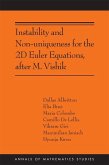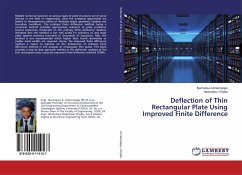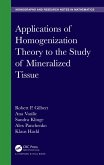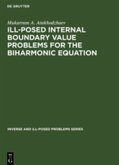- Gebundenes Buch
- Merkliste
- Auf die Merkliste
- Bewerten Bewerten
- Teilen
- Produkt teilen
- Produkterinnerung
- Produkterinnerung
This book introduces a semi-analytical method, Improved Residual Power Series Method (IRPSM) for solving boundary value problems (BVPs). Unlike traditional numerical and analytical techniques, IRPSM offers quick convergence and minimal computational time.
Andere Kunden interessierten sich auch für
![Instability and Non-Uniqueness for the 2D Euler Equations, After M. Vishik Instability and Non-Uniqueness for the 2D Euler Equations, After M. Vishik]() Camillo De LellisInstability and Non-Uniqueness for the 2D Euler Equations, After M. Vishik167,99 €
Camillo De LellisInstability and Non-Uniqueness for the 2D Euler Equations, After M. Vishik167,99 €![Deflection of Thin Rectangular Plate Using Improved Finite Difference Deflection of Thin Rectangular Plate Using Improved Finite Difference]() Ikechukwu UmeonyiaguDeflection of Thin Rectangular Plate Using Improved Finite Difference40,99 €
Ikechukwu UmeonyiaguDeflection of Thin Rectangular Plate Using Improved Finite Difference40,99 €![Applications of Homogenization Theory to the Study of Mineralized Tissue Applications of Homogenization Theory to the Study of Mineralized Tissue]() Robert P GilbertApplications of Homogenization Theory to the Study of Mineralized Tissue135,99 €
Robert P GilbertApplications of Homogenization Theory to the Study of Mineralized Tissue135,99 €![Observability and Mathematics Observability and Mathematics]() Boris KhotsObservability and Mathematics78,99 €
Boris KhotsObservability and Mathematics78,99 €![Ill-Posed Internal Boundary Value Problems for the Biharmonic Equation Ill-Posed Internal Boundary Value Problems for the Biharmonic Equation]() Mukarram A. AtakhodzhaevIll-Posed Internal Boundary Value Problems for the Biharmonic Equation115,99 €
Mukarram A. AtakhodzhaevIll-Posed Internal Boundary Value Problems for the Biharmonic Equation115,99 €![Elliptic Boundary Value Problems in the Spaces of Distributions Elliptic Boundary Value Problems in the Spaces of Distributions]() Y. RoitbergElliptic Boundary Value Problems in the Spaces of Distributions77,99 €
Y. RoitbergElliptic Boundary Value Problems in the Spaces of Distributions77,99 €![Two Methods Using Power Series for Solving Analytic Initial Value Problems Two Methods Using Power Series for Solving Analytic Initial Value Problems]() Glenn LewisTwo Methods Using Power Series for Solving Analytic Initial Value Problems31,99 €
Glenn LewisTwo Methods Using Power Series for Solving Analytic Initial Value Problems31,99 €-
-
-
This book introduces a semi-analytical method, Improved Residual Power Series Method (IRPSM) for solving boundary value problems (BVPs). Unlike traditional numerical and analytical techniques, IRPSM offers quick convergence and minimal computational time.
Produktdetails
- Produktdetails
- Verlag: Taylor & Francis Ltd
- Seitenzahl: 238
- Erscheinungstermin: 26. Mai 2025
- Englisch
- Abmessung: 234mm x 156mm
- Gewicht: 620g
- ISBN-13: 9781032956541
- ISBN-10: 1032956542
- Artikelnr.: 72104482
- Herstellerkennzeichnung
- Libri GmbH
- Europaallee 1
- 36244 Bad Hersfeld
- gpsr@libri.de
- Verlag: Taylor & Francis Ltd
- Seitenzahl: 238
- Erscheinungstermin: 26. Mai 2025
- Englisch
- Abmessung: 234mm x 156mm
- Gewicht: 620g
- ISBN-13: 9781032956541
- ISBN-10: 1032956542
- Artikelnr.: 72104482
- Herstellerkennzeichnung
- Libri GmbH
- Europaallee 1
- 36244 Bad Hersfeld
- gpsr@libri.de
Dr. Abdullah Dawar earned his BS degree from Islamia College University, Peshawar, Pakistan, his MS degree from Qurtuba University of Science and Information Technology, Peshawar, Pakistan, and his PhD degree from Abdul Wali Khan University, Mardan, Pakistan. He has over 80 research articles published in well-reputed journals. His expertise spans topics including magnetohydrodynamic, nanofluids, hybrid nanofluids, mathematical modeling, numerical and analytical methods, computational fluid dynamics, and heat and mass transfer problems. Currently, he is pioneering research on a novel methodology known as the Improved Residual Power Series Method (IRPSM). This innovative approach aims to enhance the accuracy and efficiency of solving differential equations and fluid flow problems, further advancing the field of computational and theoretical fluid dynamics. Prof. Dr. Hamid Khan received his bachelor's degree from the Government postgraduate college Mardan and his MS degree from Kohat University of Science and Technology, Kohat. His MS research work was on Matrix Inversion and the Solution of a system of linear equations. During his MS, he wrote two research articles from his work and visited Japan to present his work in IPS Program at Saga University Japan. He discussed in detail his own research theme ( Matrix Inversion and Solution of system of linear equations) with Prof Minamuto Teruyu (Department of Information Science Saga University Japan) and Prof Okazaki Yoshiaki (Kyushu Institute of Technology (KIT)). He gave two lectures on his own research theme to Professors and their research students at Saga University Japan. He is currently an Associate professor at the Department of Mathematics, Islamia College University Peshawar, Pakistan. Hamid Khan received his Ph.D. degree from Islamia college university Peshawar in 2013. He has published more than 43 research articles in well-reputed journals during his career. He also produced 7 Ph.Ds. and 16 MS students. Most of his research is on solving differential equations using the series solution techniques. He is working on a new method called the Improved Residual Power Series Method (IRPSM). He worked with serval MS and Ph.D. students on IRSPM. He published two research articles and submitted more than seven research articles based on the IRPSM technique.
1. Basic Idea of the Improved Residual Power Series Method 2. IRPSM for the
Solution of Two- and Multi-Points Boundary Value Problems 3. IRPSM for the
Solution of Partial Differential Equations with Boundary Value Problems 4.
IRPSM for the Solution of System of ODEs and PDEs with Boundary Value
Problems 5. Application of IRPSM for Singularly Perturbed and Singularly
Perturbed Delay Differential Equations 6. IRPSM for Heat Transfer Boundary
Value Problems 7. IRPSM for Finite Boundary Value Problems in Fluid
Dynamics
Solution of Two- and Multi-Points Boundary Value Problems 3. IRPSM for the
Solution of Partial Differential Equations with Boundary Value Problems 4.
IRPSM for the Solution of System of ODEs and PDEs with Boundary Value
Problems 5. Application of IRPSM for Singularly Perturbed and Singularly
Perturbed Delay Differential Equations 6. IRPSM for Heat Transfer Boundary
Value Problems 7. IRPSM for Finite Boundary Value Problems in Fluid
Dynamics
1. Basic Idea of the Improved Residual Power Series Method 2. IRPSM for the
Solution of Two- and Multi-Points Boundary Value Problems 3. IRPSM for the
Solution of Partial Differential Equations with Boundary Value Problems 4.
IRPSM for the Solution of System of ODEs and PDEs with Boundary Value
Problems 5. Application of IRPSM for Singularly Perturbed and Singularly
Perturbed Delay Differential Equations 6. IRPSM for Heat Transfer Boundary
Value Problems 7. IRPSM for Finite Boundary Value Problems in Fluid
Dynamics
Solution of Two- and Multi-Points Boundary Value Problems 3. IRPSM for the
Solution of Partial Differential Equations with Boundary Value Problems 4.
IRPSM for the Solution of System of ODEs and PDEs with Boundary Value
Problems 5. Application of IRPSM for Singularly Perturbed and Singularly
Perturbed Delay Differential Equations 6. IRPSM for Heat Transfer Boundary
Value Problems 7. IRPSM for Finite Boundary Value Problems in Fluid
Dynamics








